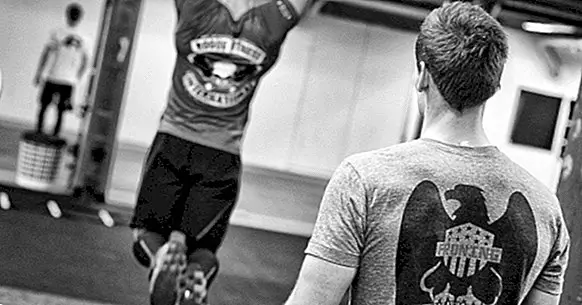Fitness Coach vs Personal Trainer: Psychology in the gym
Although the Personal Trainer (Personal Trainer) is known as a reference figure in the fitness sector to optimize physical results, a new trend begins to emerge, the Fitness Coach or Wellness Coach , coaching in healthy lifestyle.
The fitness coach helps you and inspires you to be yourself to mark your own goals and reach, generating powerful and creative conversations that invite reflection and they help you find the way to to reach your goals and keep your new healthy habits forever .
The sessions deal with diverse topics such as nutrition, exercise, sleep, stress, emotions, weight, tobacco ...
You can find the Fitness Coach in your "gym", but your work and the results go beyond the fitness rooms. The Fitness Coach fits perfectly in modern gyms where the new trend, thewellness (well-being), proliferates, and as a consequence, instead of finding rooms full of machines, now it is moving to centers where there is not only a space to train muscles, but also relaxation activities (such as spa, massage cabinets, saunas ), group classes (yoga, pilates, tai-chi ...) along with leisure and rest areas (cafeterias, hairdressers and aesthetics).
What is Wellness?
To this day, there are still many interpretations regarding the definition of fitness and wellness. TheFitness we could consider it as a equivalent of "physical condition" or "being fit" . Fitness is based on two fundamental pillars: physical activity and a healthy diet . It allows the person to improve cardiovascular endurance, flexibility, muscular strength and endurance, provides more agility and balance, speed, toning; all accompanied by a correct and balanced diet. If necessary, consuming the appropriate supplementation in each particular case, but never, anabolic. Occasionally, fitness is confused with bodybuilding, but the latter focuses on achieving a definition and volume of extreme muscles in symmetry, sacrificing the person's overall well-being and functionality.
On the other hand, the concept or philosophy Wellness it is considered as a more global term. Not only would it encompass fitness as the improvement of physical condition, but it goes further and uses physical condition as a means to improve health, providing longevity, quality of life and beauty . That is, wellness as a synonym of physical, psychic and emotional well-being . Not only interested in being in shape, but also interested look for a balance between body and mind .
Coaching in the gym
The staff of the fitness rooms and gymnasiums has grown in recent years with qualified professionals in physical activity, sports or health sciences. At the end of the s. XX, personal trainers relied on their knowledge of physical activity and biomechanics, thinking that they were enough to keep clients adhering to their programs and get them to improve their lifestyle. As time has passed, many have realized that instruction and technical support are not enough to cover the diversity of clients' agendas and the need for an individualized treatment of them. If you want to maintain the commitment of the client you have to take into account other variables, especially the psychological ones .
Research on the factors that affect the exercise, led the experts to explore the needs emotional and nutritional , and many times they revealed lifestyle patterns that were harmful, behaviors that were addictive, and personal and family challenges that interfered with achieving goals . Regarding these aspects, it was necessary that they be redirected in order to follow the training successfully. Even before psychology and coaching appeared in fitness centers, personal trainers were already aware of the need for communication skills and intervention models in these areas.
The inclusion of the Fitness Coach in the fitness rooms has given access to Appropriate methods to work with clients in these aspects . Two questions then arise regarding the Fitness Coach and the Personal Trainer: "Which method works best?" "Are the two methods equally effective for all customers?" .
In order to answer these two questions, we must understand the functioning of both models.
Fitness coach vs Personal Trainer
Customers who want to hire a fitness coach instead of a Personal Trainer should know that they will find two work methodologies and two different communication techniques s. The Fitness Coach will prioritize the construction of the relationship and communication . It will focus on client stories and strategies, and provide motivational and support messages (for example, using NLP techniques). Although some coaching schools recommend giving advice, most coaches encourage the client to come to the answer only by using powerful questions (Socratic questions) that challenge and confront their self-perceptions and their limiting beliefs .
It is a process of research and personal discovery to help the client to be more aware, identify and take responsibility for realistic objectives, with a focus on strategies, actions and feedback.
The Personal Trainer may have similar aspects, but it is more focused on instructions and technical information . In addition, he uses a more practical approach guiding the client during the exercises and training, with a managerial style of communication, and creating a dependency relationship of the person you are guiding . Personal trainers are more concerned with defining their role as experts in physical training and biomechanical knowledge, but they do not encourage personal growth or ensure that the client learns the authentic concept of well-being.
Now, after learning that coaches and personal trainers rely on different work methodologies, it is time to respond to the second question posed above: "Do the two methods work equally for all people?" To answer this question we need to understand the client, since each person is different, has different objectives, unique past experiences and needs that can vary from one to another. Therefore, to better understand the needs of the client, one must understand the Theory of Self-efficacy of Albert Bandura (1977) , which emphasizes the role that fulfills what one says to oneself during the process of acquiring the objectives that aims to achieve, and determines the behavior and the way of acting in each situation.
Self-efficacy: The key to achieving long-term goals
The Self-efficacy are the judgments and beliefs that a person has about their abilities to execute a certain task successfully and, therefore, directs the course of their action . These expectations determine the preference for certain activities, motivation, persistence in these tasks and emotional responses to various situations. In addition, and very important, the expectations of self-efficacy are variable and specific to each context. For example, beliefs will be different when it comes to swimming or when preparing to run marathons. Self-efficacy beliefs are affected by past achievements, vicarious learning or observation of others' behavior, verbal persuasion or level of emotional activation.
Some clients may come to the gym with knowledge about nutrition and exercise, but are unable to adhere to a training plan or diet. Others, however, will know absolutely nothing about the exercises they should perform.
The first example refers to people who dominate self-efficacy related to physical activity, but may have cognitive and emotional difficulties when designing, implementing or maintaining behaviors related to the acquisition of goals. The second example refers to people who need instruction to be able to start exercising and, therefore, they will need a managerial style to be able to start on the right foot, get quick results and not be injured.
Observing the Self-efficacy of the clients from different angles, it will allow us identify people who must improve their physical ability to achieve their goals, or give us information about people who need to improve their cognitive and emotional skills to successfully handle the necessary transitions in a process of change.
conclusion
In summary, people can count on skills and competencies that are a necessary condition, but not sufficient to achieve the objectives . One of the variables that influence the acquisition of goals is the perception of self-efficacy, that is, the expectation of success that the person has when faced with a particular situation, depending on the resources he believes he has and the characteristics of the situation and the context.
A person can avoid situations in which he doubts his capacity, however suggestive a certain objective may be, believing that he does not have the necessary resources to achieve it. The perception of self-efficacy is key in the coaching process and is necessary to achieve goals to long term . The Personal Trainer can have very useful tools and the Fitness Coach too. Ideally to be a good professional of this field is to possess the necessary skills to be able to use Both forms of work according to the needs of the client .



















